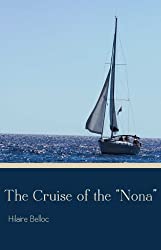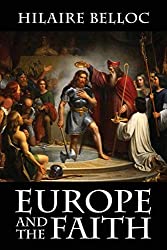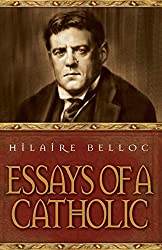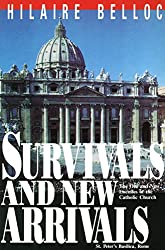
This is more of a notice, rather than a proper review.
Still, I noticed that the fine Loreto books recently reissued Hilaire Belloc’s classic The Cruise of the Nona. And apparently they mean to re-issue more from my beloved ‘mentor’ at this website.
Such initiative deserves support! Now, I have no time at present to give this book its full due. But I paste in a tiny review I wrote for Amazon—plus a small sample from the book. First my few words at Amazon:
What can I say? Everything Belloc touched turns to magic for me.
This book, however, is the closest the great man ever came to autobiography. Whilst ostensibly, Belloc is recording a sea journey made around the coast of Britain, the occasion gives rise to many memories from his past.
In addition to these reminiscences, the book is also filled with his penetrating analysis of Europe and the world in the 1920s.
Some have found the sailing sections a little slow, with their technical language on the art of boating. I confess to feeling a bit the same.
But the rest more than makes up for it! Belloc’s view of the events that were current in his time is always shrewd and penetrating. And if only he had written more autobiography like the fragments given here …
Highly recommended.
To these words. Iwill only add that I would most recommend this to the reader who has already fallen in love with Belloc’s writing, as I have.
In other words, it is probably not the best Belloc book to begin with. For that I would recommend certain titles I have already reviewed in depth at this site, including Europe and the Faith (here) Essays of a Catholic (here), The Great Heresies (here) and the profound Survivals and New Arrivals (here). (The latter might even be his greatest work I think: prophetic and still very relevant today.)
That being said, we will feature here a brief autobiographical passage from the book. This is sure to stir the hearts of all those who love Belloc; it illumines profound things about the course of his life and the development of his thinking.
I will only note that I am adding a few italics which may help clarity and breaking the original long paragraphs down into shorter ones for internet reading.
Belloc on Two Statements in That Shaped the Course of His Life
There is another form of impressing the truth, and testifying to it, and doing good by it, which is the dogmatic assertion of truth by the old and the experienced and the revered, to the young. …
I can myself testify to two such experiences which stand out supreme among many hundreds in my own early life.
I am afraid they may seem trivial to my readers. I can only say that for myself they were as strong experiences as any great joy or pain could be.
One was a sentence which Cardinal Manning said to me when I was but twenty years old. The other was one which the Master of my College, Dr. Jowett, of Balliol, said to me when I was twenty-two years old.
The profound thing which Cardinal Manning said to me was this: all human conflict is ultimately theological.

It was my custom during my first days in London, as a very young man, before I went to Oxford, to call upon the Cardinal as regularly as he would receive me; and during those brief interviews I heard from him many things which I have had later occasion to test by the experience of human life.
I was, it may be said, too young to judge things so deep as sanctity and wisdom; but, on the other hand, youth has vision, especially upon elemental things ; and Manning did seem to me (and still seems to me) much the greatest Englishman of his time.
He was certainly the greatest of all that band, small but immensely significant, who, in the Victorian period, so rose above their fellows, preeminent in will and in intelligence, as not only to perceive, but even to accept the Faith. Not only did his powerful mind discover, but his powerful will also insisted upon all the difficult consequences of such an acceptation. He never admitted the possibility of compromise between Catholic and non-Catholic society. He perceived the necessary conflict, and gloried in it.
This saying of his (which I carried away with me somewhat bewildered) that all human conflict was ultimately theological: that is, that all wars and revolutions and all decisive struggles between parties of men arise from a difference in moral and transcendental doctrine, was utterly novel to me.
To a young man the saying was without meaning: I would almost have said nonsensical, save that I could not attach the idea of folly to Manning. But as I grew older it became a searchlight with the observation of the world, and with continuous reading of history, it came to possess for me a universal meaning so profound that it reached to the very roots of political action; so extended that it covered the whole.

It is, indeed, a truth which explains and co-ordinates all one reads of human action in the past, and all one sees of it in the present. Men talk of universal peace: it is only obtainable by one common religion. Men say that all tragedy is the conflict of equal rights. They lie. All tragedy is the conflict of a true right and a false right, or of a greater right and a lesser right, or, at the worst, of two false rights.
Still more do men pretend in this time of ours, wherein the habitual use of the human intelligence has sunk to its lowest, that doctrine is but a private, individual affair, creating a mere opinion.
Upon the contrary, it is doctrine that drives the State; and every State is stronger in the degree in which the doctrine of its citizens is united. Nor have I met any man in my life, arguing for what should be among men, but took for granted as he argued that the doctrine he consciously or unconsciously accepted was or should be a similar foundation for all mankind. Hence battle.
The truth Dr. Jowett gave me came thus. He asked me the political question which was always uppermost in his mind, and which he believed all young men should consider. It was, “Under what form of government is the state of man at its best?” I answered as all young men should answer, “A Republic,” to which he answered gently in his turn, “You cannot have a Republic without Republicans.”
Now that, for terseness and truth and a certain quality of revelation, was worthy of Aristotle. It is the full answer, historical and moral, to every honest man who desires, as most honest men do, democracy, and who wonders why it is so hard to attain. But I had never considered that answer ; and I think if I had not heard these half dozen words I might never have considered it.
Democracy, that is, the government of the community by the community : a State wherein a man stands equal with his fellows, and has to suffer neither subservience nor the corruption of flattery and power : a State in which office alone commands, and not the being clothed with office-that is the ideal at the back of every man’s mind who cares for right in public affairs, and who has within himself anything left of private honour. It is simplest put by saying that democracy is the noblest form of government.
But the moment you begin to deal with men, you find in varying degree, according to the human material handled, a difficulty in the direction of such an affair.
You have experience of the wickedness and folly of men, and if you add to such growing experience the vast experience of history, you find that, save in some few, and those small, communities, the ideal of democracy must break down in practice; and that so far from enjoying the noblest of social conditions, men attempting democracy in great States are soon suffering the basest forms of control by the rich.
That is because most men, though intimately desiring a republic, are not republicans: when you have great numbers, those worthy of democracy are few.
In the same way most men, though individually desiring peace within, have not the control of themselves which makes such peace possible.
So much for the Master’s excellent platitude.
It is strange that things worth saying and hearing, guiding things, should always have that quality of turning into platitudes, once they are familiar ; for they were sudden revelations when first they came. To me now the impracticability of democracy among men indifferent to honour and justice is so clear that I never pause to consider it, well knowing that you cannot have the thing in any modern plutocratic State ; that even in small States it needs a peculiarly admirable and rare temper in the human material of them. But this conviction came slowly, and all started from those few words.

Buying Books at Amazon Through These Links Gives Us a Commission. This Supports Our Apostolate. Thank You if You Can Help Us Like This!




